Unit 9 I like music that I can dance to. Section B (2a~2e) 课件(共24张PPT) 2024-2025学年人教版英语九年级全一册
文档属性
| 名称 | Unit 9 I like music that I can dance to. Section B (2a~2e) 课件(共24张PPT) 2024-2025学年人教版英语九年级全一册 |  | |
| 格式 | pptx | ||
| 文件大小 | 1.0MB | ||
| 资源类型 | 教案 | ||
| 版本资源 | 人教新目标(Go for it)版 | ||
| 科目 | 英语 | ||
| 更新时间 | 2024-07-21 22:14:10 | ||
图片预览

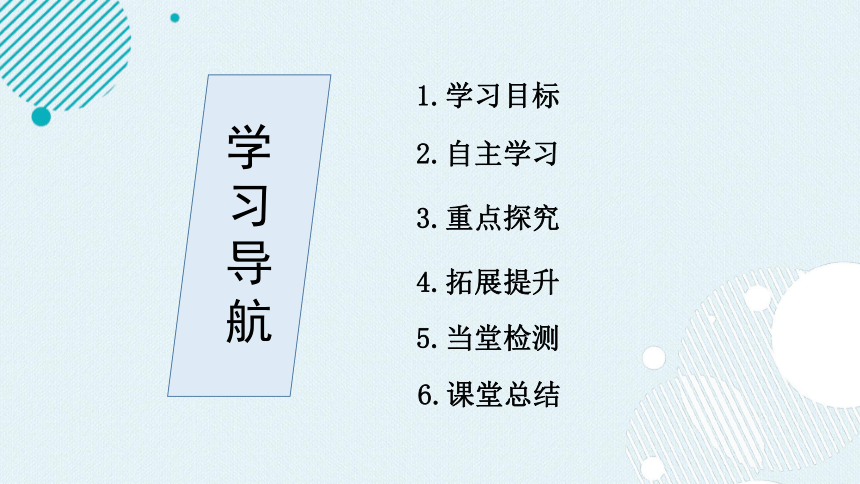
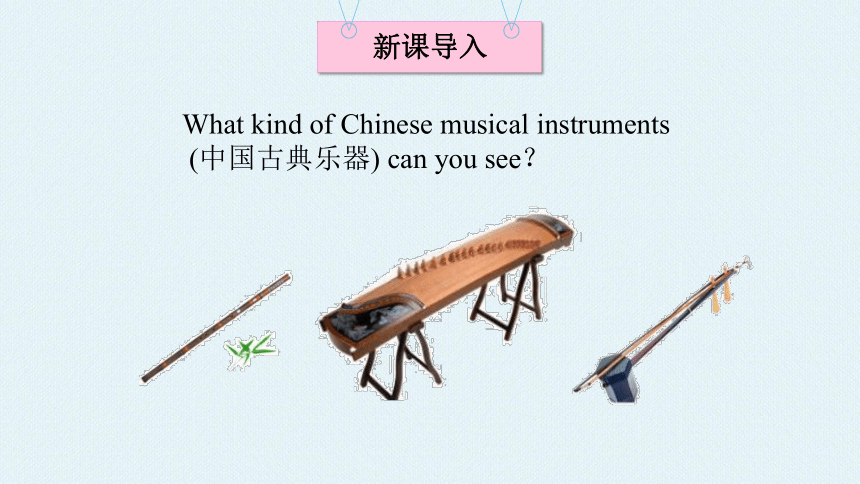
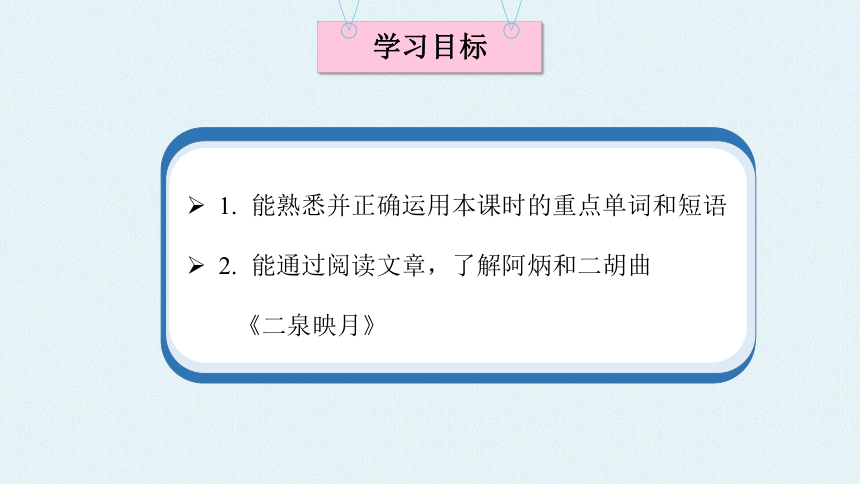
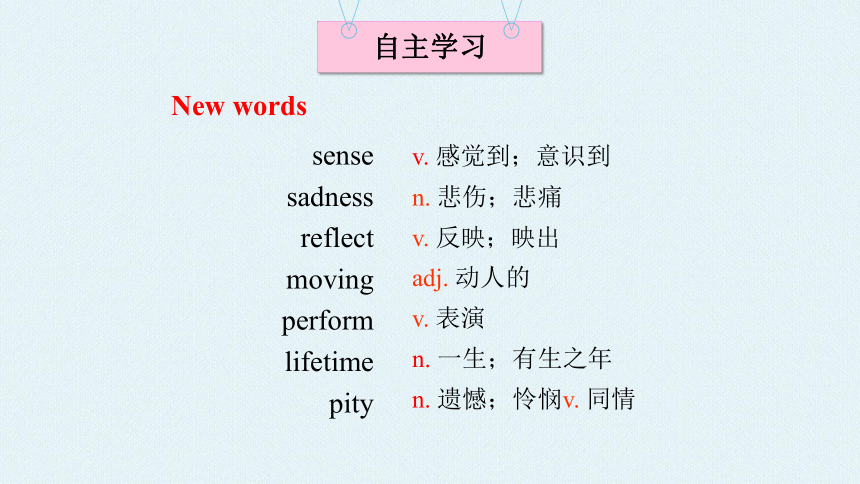
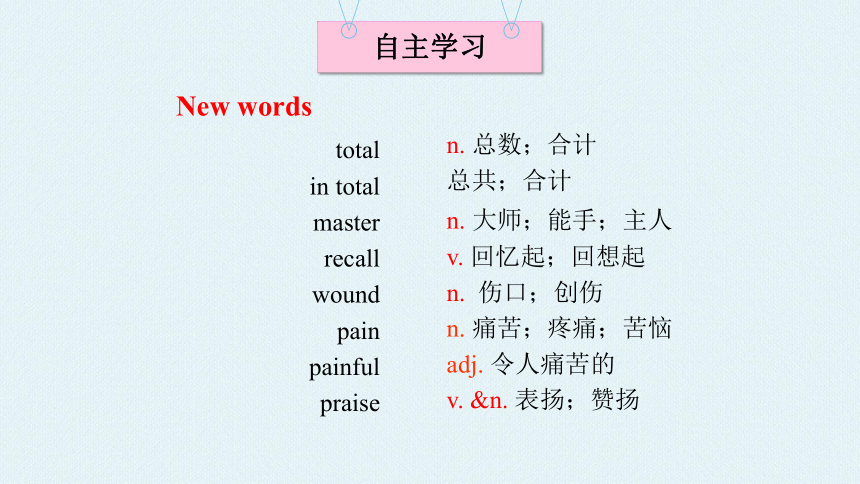
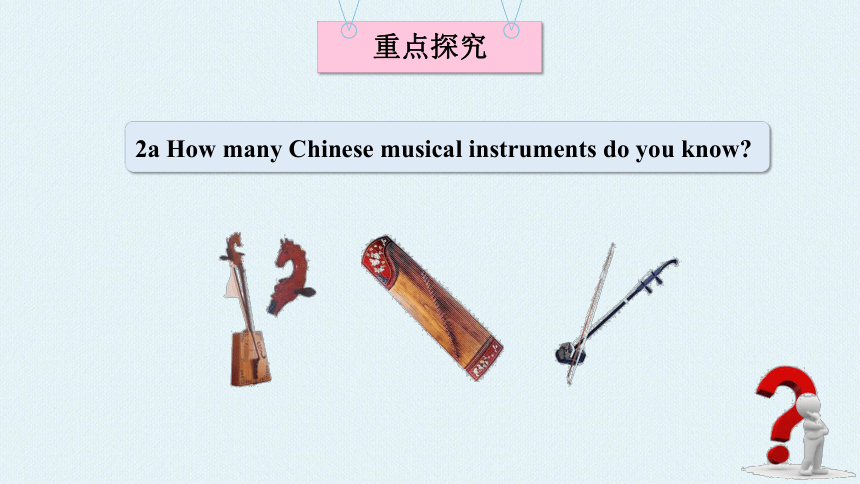
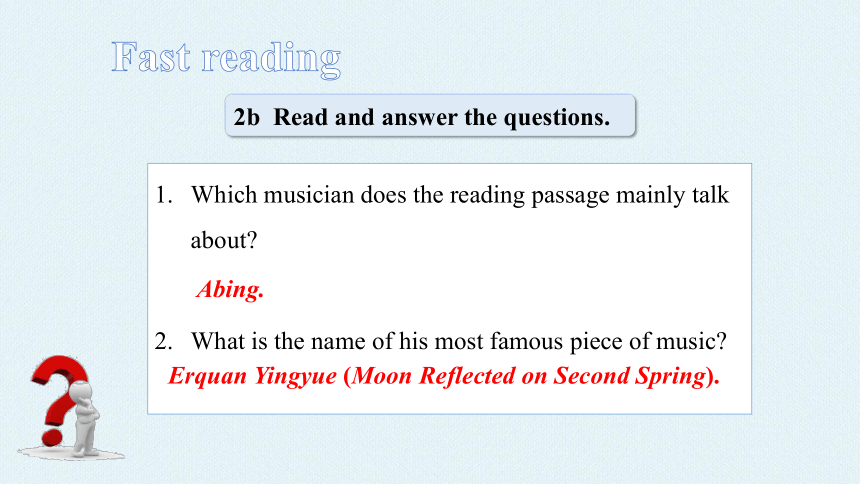
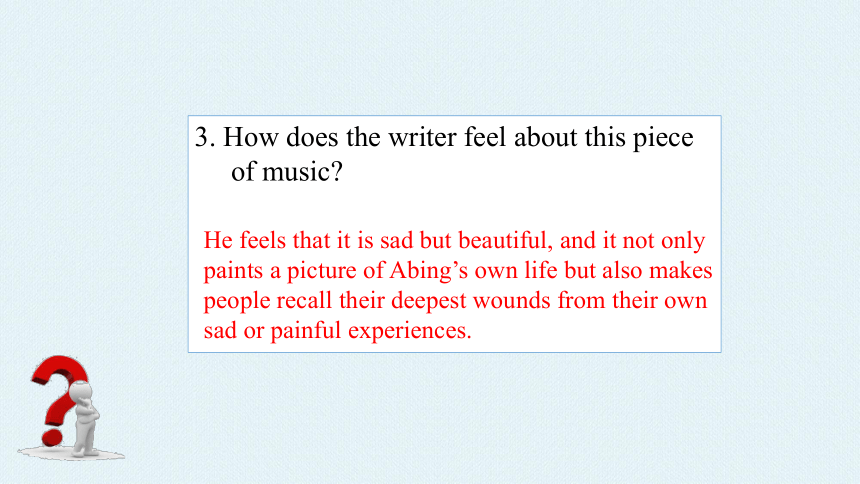
文档简介
(共24张PPT)
Unit 9
I like music that I can dance to.
Section B (2a~2e)
1.学习目标
3.重点探究
2.自主学习
学习导航
5.当堂检测
6.课堂总结
4.拓展提升
新课导入
What kind of Chinese musical instruments
(中国古典乐器) can you see?
学习目标
1. 能熟悉并正确运用本课时的重点单词和短语
2. 能通过阅读文章,了解阿炳和二胡曲
《二泉映月》
自主学习
New words
sense
sadness
reflect
moving
perform
lifetime
pity
v. 感觉到;意识到
n. 悲伤;悲痛
v. 反映;映出
adj. 动人的
v. 表演
n. 一生;有生之年
n. 遗憾;怜悯v. 同情
自主学习
New words
total
in total
master
recall
wound
pain
painful
praise
n. 总数;合计
总共;合计
n. 大师;能手;主人
v. 回忆起;回想起
n. 伤口;创伤
n. 痛苦;疼痛;苦恼
adj. 令人痛苦的
v. &n. 表扬;赞扬
重点探究
2a How many Chinese musical instruments do you know
2b Read and answer the questions.
Fast reading
Which musician does the reading passage mainly talk about
What is the name of his most famous piece of music
Abing.
Erquan Yingyue (Moon Reflected on Second Spring).
3. How does the writer feel about this piece of music
He feels that it is sad but beautiful, and it not only paints a picture of Abing’s own life but also makes people recall their deepest wounds from their own sad or painful experiences.
2c Read the passage again and use the suitable words to
complete the main idea of each paragraph. Then list
the supporting details in each paragraph.
Careful reading
Para.1: I was ________ by a piece of music named Erquan Yingyue.
Supporting details:
The music was strangely beautiful but under the beauty I sensed a strong sadness and pain.
It was one of the most moving pieces of music I’ve ever heard.
The erhu sounded so sad that I almost cried along with it as I listened.
moved
Para.2: Abing lived a very ________ a life.
Supporting details:
His mother died when he was very young.
His father died when he was a teenager.
He was poor and homeless.
He developed an illness and became blind.
He lived on the streets and played music to make money.
hard
Para.3: Abing's musical skills made him very ________.
Supporting details:
He could play over 600 pieces, and he wrote many of them himself.
His most famous piece is still played and praised by erhu masters today.
Erquan Yingyue has become one of China’s national treasures.
popular
2d Circle that or who and fill in the blanks with the
words in the box.
Abing played music (that/who) could touch the hearts of people. When we listen to his music, we can _____ both the beauty and the sadness in it. It makes us think about the ______ and _____ (that/who) we have experienced in the past. For this reason, many people _____ him as the musician (that/who) has greatly influenced erhu music. So it is really a _____ that not many pieces of his music were recorded.
sense
pain
wounds
praise
pity
pain
wounds
sense
pity
praise
2e Student A is a foreign visitor who is interested in Abing and his
music. Student B is a Chinese student who knows about Abing.
Use the information in the passage to make a conversation.
Discuss
拓展提升
Language points
1. moved作为及物动词,意为 “打动;使感动”,可用于被动语态。
What he said moved everyone present.
他所说的打动了在场的每个人。
move 还可以意为“移动;搬动” 常用 “move to sp.” 表示“搬到某地”。
My family moved to Beijing when I was young.
我很小的时候,我们全家搬到了北京。
2. sense (to become aware of sth. even though you cannot see it, hear it, etc.) 动词意为“感觉到; 意识到” 。
The horse sensed danger and stopped.
马感觉到了危险,停了下来。
sense 作为名词,意为“感觉;意识”常见搭配有make sense “有意义;有道理”
The sentence doesn’t make sense.
这个句子讲不通。
3. pain 意为 “痛苦;疼痛;苦恼”。
He has a pain in his knee. 他膝盖疼。
4. sadness意为“悲痛;悲伤”,其反义词为happiness,意为“幸福”。
Tom loved his wife so much that he didn’t get over the sadness of losing her last year.
汤姆如此爱他的妻子,以至于没从去年失去她的悲伤中
恢复过来。
5. perform 动词,意为“表演;演奏;执行”。
He wants to perform in the show.
他想在这场演出中表演。
performance为其名词,意为“表演;演出”。
I hear there will be two performances tomorrow.
我听说明天将有两场演出。
performer意为“表演者”,为可数名词。
6. by the end of 意为 “到……结束时”,其后若跟不同的时间,主句则对应不同的时态。
接将来的时间,主句用一般将来时。
By the end of next month, I will finish reading this book.
接现在的时间,主句用现在完成时。
By the end of this week, I have written two books.
接过去的时间,主句用过去完成时。
By the end of last month, I had planted thousands of trees.
7. It’s a pity +that 从句,为保持句子平衡,常用it 作形式主语,that 引导的从句才为真正的主语。
It’s a pity that he has lost his watch.
遗憾的是,他丢了手表。
pity 作可数名词,表示具体意义的 “可惜的事;遗憾的事”,相当于shame。
What a pity/shame you have to go to another school!
你必须去别的学校上学,真遗憾!
8. master意为“能手;名家;大师;主人”。
The painting is the work of a master. 这幅画是名家之作。
praise 及物动词,意为 “表扬;赞扬”,后面直接跟表示人或物的名词或者代词作宾语。常用结构praise sb for (doing) sth意为 “因(做)某事而表扬某人”; be praised for…意为“因……而受到表扬”。
Though he was wrong, his father praised him for telling the truth. 他虽然错了,但父亲表扬他说了实话。
He was praised for helping an old man.
他因帮助了一位老人而受到表扬。
当堂检测
Ⅰ. 根据句意及汉语提示完成单词。
1.I have a ________ (感觉) of happiness.
2.She has a ________ (痛苦) on her back.
3.The ________ (伤口) made him very painful.
4.Mary has ________ (掌握) the language.
5.I ________ (表扬) his behaviour.
sense
pain
wound
mastered
praised
Ⅱ. 用所给单词的适当形式填空。
1..I have spare time ________ (go) shopping with my uncle.
2.We should learn how ________ (deal) with difficulties.
3.I wonder how ________ (master) English.
4.It is easy for me ________ (work) out the problem.
5.The ________ (pain) expression (表情) on her face
suggested that she had known the sad news.
to go
to deal
to master
to work
painful
课堂总结
重要短语、句型:
by the end of 到……结束时
It’s a pity +that 从句
重要单词:
moved 意为 打动, 使感动
sense 意为 感觉到,意识到
pain 意为 痛苦,疼痛,苦恼
sadness意为 悲痛, 悲伤
perform 意为 表演, 演奏
master意为 能手,名家,大师
Unit 9
Section B (2a~2e)
Unit 9
I like music that I can dance to.
Section B (2a~2e)
1.学习目标
3.重点探究
2.自主学习
学习导航
5.当堂检测
6.课堂总结
4.拓展提升
新课导入
What kind of Chinese musical instruments
(中国古典乐器) can you see?
学习目标
1. 能熟悉并正确运用本课时的重点单词和短语
2. 能通过阅读文章,了解阿炳和二胡曲
《二泉映月》
自主学习
New words
sense
sadness
reflect
moving
perform
lifetime
pity
v. 感觉到;意识到
n. 悲伤;悲痛
v. 反映;映出
adj. 动人的
v. 表演
n. 一生;有生之年
n. 遗憾;怜悯v. 同情
自主学习
New words
total
in total
master
recall
wound
pain
painful
praise
n. 总数;合计
总共;合计
n. 大师;能手;主人
v. 回忆起;回想起
n. 伤口;创伤
n. 痛苦;疼痛;苦恼
adj. 令人痛苦的
v. &n. 表扬;赞扬
重点探究
2a How many Chinese musical instruments do you know
2b Read and answer the questions.
Fast reading
Which musician does the reading passage mainly talk about
What is the name of his most famous piece of music
Abing.
Erquan Yingyue (Moon Reflected on Second Spring).
3. How does the writer feel about this piece of music
He feels that it is sad but beautiful, and it not only paints a picture of Abing’s own life but also makes people recall their deepest wounds from their own sad or painful experiences.
2c Read the passage again and use the suitable words to
complete the main idea of each paragraph. Then list
the supporting details in each paragraph.
Careful reading
Para.1: I was ________ by a piece of music named Erquan Yingyue.
Supporting details:
The music was strangely beautiful but under the beauty I sensed a strong sadness and pain.
It was one of the most moving pieces of music I’ve ever heard.
The erhu sounded so sad that I almost cried along with it as I listened.
moved
Para.2: Abing lived a very ________ a life.
Supporting details:
His mother died when he was very young.
His father died when he was a teenager.
He was poor and homeless.
He developed an illness and became blind.
He lived on the streets and played music to make money.
hard
Para.3: Abing's musical skills made him very ________.
Supporting details:
He could play over 600 pieces, and he wrote many of them himself.
His most famous piece is still played and praised by erhu masters today.
Erquan Yingyue has become one of China’s national treasures.
popular
2d Circle that or who and fill in the blanks with the
words in the box.
Abing played music (that/who) could touch the hearts of people. When we listen to his music, we can _____ both the beauty and the sadness in it. It makes us think about the ______ and _____ (that/who) we have experienced in the past. For this reason, many people _____ him as the musician (that/who) has greatly influenced erhu music. So it is really a _____ that not many pieces of his music were recorded.
sense
pain
wounds
praise
pity
pain
wounds
sense
pity
praise
2e Student A is a foreign visitor who is interested in Abing and his
music. Student B is a Chinese student who knows about Abing.
Use the information in the passage to make a conversation.
Discuss
拓展提升
Language points
1. moved作为及物动词,意为 “打动;使感动”,可用于被动语态。
What he said moved everyone present.
他所说的打动了在场的每个人。
move 还可以意为“移动;搬动” 常用 “move to sp.” 表示“搬到某地”。
My family moved to Beijing when I was young.
我很小的时候,我们全家搬到了北京。
2. sense (to become aware of sth. even though you cannot see it, hear it, etc.) 动词意为“感觉到; 意识到” 。
The horse sensed danger and stopped.
马感觉到了危险,停了下来。
sense 作为名词,意为“感觉;意识”常见搭配有make sense “有意义;有道理”
The sentence doesn’t make sense.
这个句子讲不通。
3. pain 意为 “痛苦;疼痛;苦恼”。
He has a pain in his knee. 他膝盖疼。
4. sadness意为“悲痛;悲伤”,其反义词为happiness,意为“幸福”。
Tom loved his wife so much that he didn’t get over the sadness of losing her last year.
汤姆如此爱他的妻子,以至于没从去年失去她的悲伤中
恢复过来。
5. perform 动词,意为“表演;演奏;执行”。
He wants to perform in the show.
他想在这场演出中表演。
performance为其名词,意为“表演;演出”。
I hear there will be two performances tomorrow.
我听说明天将有两场演出。
performer意为“表演者”,为可数名词。
6. by the end of 意为 “到……结束时”,其后若跟不同的时间,主句则对应不同的时态。
接将来的时间,主句用一般将来时。
By the end of next month, I will finish reading this book.
接现在的时间,主句用现在完成时。
By the end of this week, I have written two books.
接过去的时间,主句用过去完成时。
By the end of last month, I had planted thousands of trees.
7. It’s a pity +that 从句,为保持句子平衡,常用it 作形式主语,that 引导的从句才为真正的主语。
It’s a pity that he has lost his watch.
遗憾的是,他丢了手表。
pity 作可数名词,表示具体意义的 “可惜的事;遗憾的事”,相当于shame。
What a pity/shame you have to go to another school!
你必须去别的学校上学,真遗憾!
8. master意为“能手;名家;大师;主人”。
The painting is the work of a master. 这幅画是名家之作。
praise 及物动词,意为 “表扬;赞扬”,后面直接跟表示人或物的名词或者代词作宾语。常用结构praise sb for (doing) sth意为 “因(做)某事而表扬某人”; be praised for…意为“因……而受到表扬”。
Though he was wrong, his father praised him for telling the truth. 他虽然错了,但父亲表扬他说了实话。
He was praised for helping an old man.
他因帮助了一位老人而受到表扬。
当堂检测
Ⅰ. 根据句意及汉语提示完成单词。
1.I have a ________ (感觉) of happiness.
2.She has a ________ (痛苦) on her back.
3.The ________ (伤口) made him very painful.
4.Mary has ________ (掌握) the language.
5.I ________ (表扬) his behaviour.
sense
pain
wound
mastered
praised
Ⅱ. 用所给单词的适当形式填空。
1..I have spare time ________ (go) shopping with my uncle.
2.We should learn how ________ (deal) with difficulties.
3.I wonder how ________ (master) English.
4.It is easy for me ________ (work) out the problem.
5.The ________ (pain) expression (表情) on her face
suggested that she had known the sad news.
to go
to deal
to master
to work
painful
课堂总结
重要短语、句型:
by the end of 到……结束时
It’s a pity +that 从句
重要单词:
moved 意为 打动, 使感动
sense 意为 感觉到,意识到
pain 意为 痛苦,疼痛,苦恼
sadness意为 悲痛, 悲伤
perform 意为 表演, 演奏
master意为 能手,名家,大师
Unit 9
Section B (2a~2e)
同课章节目录
- Unit 1 How can we become good learners.
- Section A
- Section B
- Unit 2 I think that mooncakes are delicious!
- Section A
- Section B
- Unit 3 Could you please tell me where the restroom
- Section A
- Section B
- Unit 4 I used to be afraid of the dark.
- Section A
- Section B
- Unit 5 What are the shirts made of?
- Section A
- Section B
- Review of Units 1-5
- Unit 6 When was it invented?
- Section A
- Section B
- Unit 7 Teenagers should be allowed to choose their
- Section A
- Section B
- Unit 8 It must belong to Carla.
- Section A
- Section B
- Unit 9 I like music that I can dance to.
- Section A
- Section B
- Unit 10 You're supposed to shake hands.
- Section A
- Section B
- Review of Units 6-10
- Unit 11 Sad movies make me cry.
- Section A
- Section B
- Unit 12 Life is full of the unexpected
- Section A
- Section B
- Unit 13 We're trying to save the earth!
- Section A
- Section B
- Unit 14 I remember meeting all of you in Grade 7.
- Section A
- Section B
- Review of Units 11-14
